Quartz vs Granite Countertops: Which is Better for Your Home?
- Hits: 6638
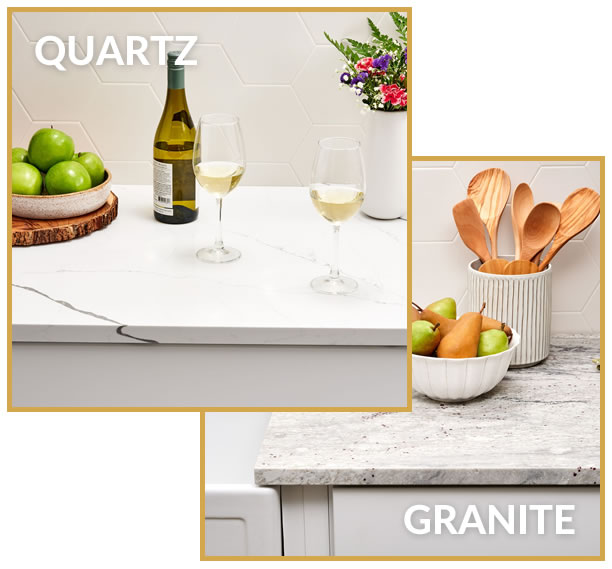
Quartz vs Granite countertops difference

For a balanced choice it is necessary to understand the differences in the types of stone - quartz and granite. Despite the fact that both are types of stone they still have very significant cardinal differences, let's consider them.
To begin with let's say that the stone for countertops is divided into two large categories - natural and artificial stone. And the both kinds of stone find their buyers in the market, the natural one - due to its uniqueness and originality, and the artificial one - due to a more uniform predictable color palette, texture and overall uniform structure, which affects the durability and ease of manufacturing products.
Quartz stone for countertops
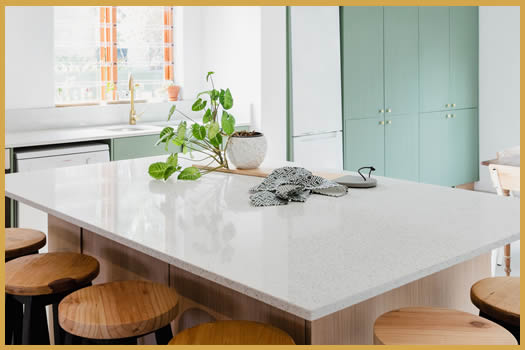
Quartz stone is an artificial material that is created by mixing natural quartz and polymer components, as a result, after "baking" the stone in production, we get a very strong, uniform in structure but almost unlike natural stone, which is excellent for making countertops, finishing walls, windows, stairs.
Quartz comes in slabs up to 139 inches long and up to 79 inches wide, with a thickness of 2 or 3 centimeters. Larger slab sizes allow for larger countertops to be made with minimal joints and joints, preserving the structure and pattern of the stone. The color palette of quartz stone as a rule consists of light shades: white, gray, cream, beige, yellowish-golden colors and variations, darker shades of this type of stone are less often available.
So how is this kind of stone made? When the word "stone" many people think only of natural materials, but technology does not stand still and now we can almost 100% imitate stone with modern technology. So, to make a quartz slab of stone, they take a natural quartz powder, some desired dye and a small proportion (5%) of polymer resins. Then all this is mixed, a necessary texture (pattern) of veins is created, with mixtures containing various dyes, imitating a natural stone and then baked in a special furnace, where it acquires the properties of stone. The slab is then subjected to the necessary quality control and polished.
Granite stone for countertops
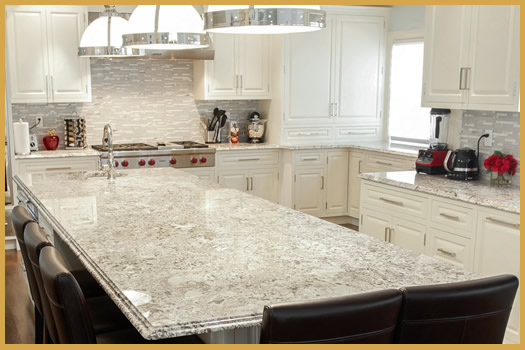
Granite is a completely natural igneous rock. Granite is formed by natural forces deep in the bowels of the earth for a very long time, because of this granite stone has always a unique unique texture and color features. One of the basic advantages granite is its incredible firmness, often from this material make surfaces which have big loadings on abrasion - in this case furnish with a granite can serve decades, and in architecture there are granite elements of age in hundred years, and thus they keep the properties!
Color palette granite is the most diverse and richest of all types of stone, you can find the stone almost any color and shade - from light, almost white tones to coal-black, as well as granite all the major colors: red, green, blue, yellow, beige, gray and many other variations and shades. Since granite is a natural material, it is produced in special quarries where granite blocks are separated from the bulk of the rock, then large rectangular blocks of stone are delivered to factories where the stone is sawn into flat plates - slabs, of varying thickness. The slabs are then polished, the stone pattern (texture) is revealed and, if necessary, the stone is reinforced with reinforcements to prevent it from cracking during transport or production. Despite the high hardness, slabs (slabs) of granite can be quite fragile themselves, it is due to the uneven structure of the stone, which was created naturally in the volcanic magma.
Quartz vs Granite Appearance: colors, textures, composition

The appearance of the stone - the most important indicator by which we choose what to make our countertop, so the choice of stone is by and large the choice of texture (pattern) of the stone and in the second place is the choice of material for physical properties. Let's take a look at what external features have quartz and granite.
On the stone with what appearance you choose depends on the atmosphere in your home or kitchen, mood and even a sense of warmth or vice versa - cool.
Appearance, colors and textures of Quartz
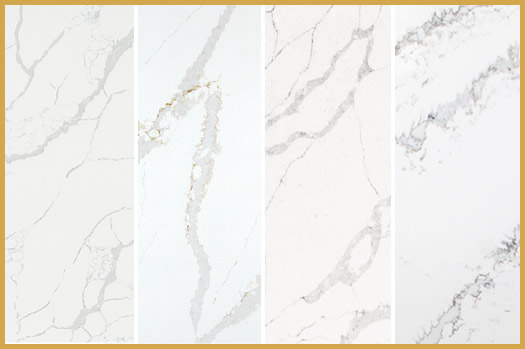
The main trend in quartz production at the moment is light shades, from pure white to beige, yellowish, golden and gray. Most quartz is in these shades. As for texture, different types of quartz have veins and texture imitating natural stone, mainly marble. It includes quartz with a barely perceptible vein texture as well as a very intense, bright pattern. Among the lighter kinds of quartz, the most common is Calacatta, which is widely represented in our catalog. In general, lighter kinds of quartz allow you to create a very bright interior and visually add space even in a small kitchen.
In addition to light types of quartz, you can also find dark types of this stone, in black and brown shades, such as Calacatta Nero Quartz, Calacatta Nocturne Quartz, Star Galaxy Quartz, Black Galaxy Quartz.
Appearance, color palette and textures of Granite
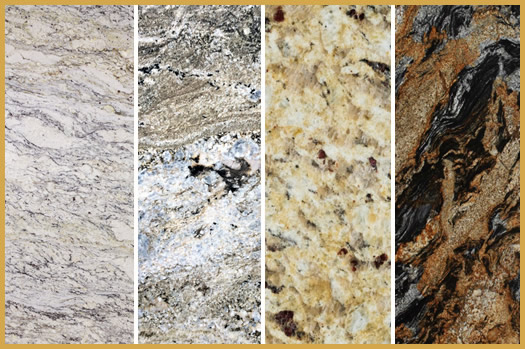
As a natural material, granite has a much richer palette of colors and textures than quartz or any other artificially created stone. The colors of quartz are determined by the chemical impurities in its composition and range from white and gray hues to bright reds, golds, greens, blues, pinks and the darkest browns and blacks of granite. The texture of the stone is determined by its origin, most types of granite are granular structures, with varying degrees of grain size, rare granite with a wavy texture, formed by the flows of solidified magma, but they are much more attractive when choosing a stone for the interior and can create countertops or wall panels of amazing beauty and uniqueness.
One of the main advantages of granite as a natural stone is uniqueness and originality of each slab (slab), because the color and texture are created by nature itself and never repeat. You can be sure that the tabletop with an unusual undulating texture of natural granite will be only at you and will not be repeated anywhere else, in this respect, granite products have much in common with unique and unrepeatable works of art. From this property of granite follows one peculiarity of choice of this stone - you should personally select the slabs for their products by visiting stone warehouses, because the typical photos may not reflect the actual pattern of a unique slab and can be quite different from the actual appearance. Remember - every slab of granite will differ from such another even if you consider the same kind of granite stone!
Care of quartz and granite, durability of stone

Physical properties and care of quartz
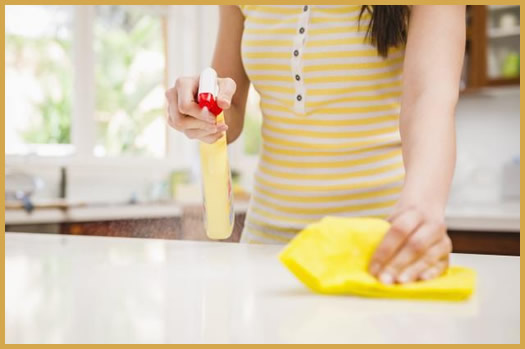
Quartz is a very hard stone, due to the use of natural stone and artificial binder we get on the one hand high hardness, which for example exceeds marble but at the same time maintains the strength of the stone due to polymeric binder, not allowing the stone to crumble or break off. Quartz is also extremely resistant to the appearance of stains, as the material itself contains a minimum number of pores and voids, the surface of the stone in the manufacture of quartz stone is as if "sealed" with a special compound that is applied to the surface of the thinnest invisible layer. However, if you still damage the surface of the quartz countertop, you will most likely have to contact experts for repair, because finding a suitable material to fill the pothole or chipping will not be that easy, in addition, quartz has a peculiar adhesion and repair requires the use of special adhesives and repair compositions that will hold strong in the future.
You can use almost any household cleaners as a cleaning agent, but you can also buy a special cleaner for cleaning quartz countertops.
As for high temperatures, you can not put too hot red-hot pots and pans on the quartz countertop, it can lead to damage to the surface, which contains polymers.
Physical properties and care of granite
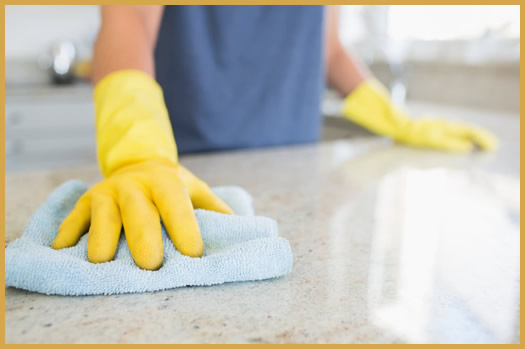
Granite is harder than quartz because it is composed entirely of minerals and is one of the hardest stones in nature. But having the highest hardness, granite is still more fragile than quartz, if we consider the properties of the product, such as a countertop. On the granite more often there are chips, so be sure to require special treatment of the surface of the granite with protective compounds that form a special film that prevents chips and potholes, the application of such a composition should be performed regularly. These compositions form a protective film also help "seal" the pores of natural stone and make it less susceptible to dyes and chemical pollution.
At occurrence of chips or potholes in a surface of a granite table-top you can independently make repair with the help of epoxy resins and stains of corresponding colors, participation of experts is required only in very difficult cases or in case of occurrence on a table-top of the big and long cracks though it already can speak about a manufacturing defect or bad-quality installation of a table-top and you need to address for guarantee service.
We recommend using special detergents and stain removers to clean natural granite surfaces, regular chemicals may stain the stone or be absorbed into the surface. Granite surfaces are not afraid of high temperatures, you can safely put a hot frying pan on such a countertop without fear of damaging the stone, but if you often do so you will need to regularly update the protective top layer of stone, which should be applied to prevent chipping and excessive absorption of liquids by the surface.
Price of quartz and granite countertops, comparison

Prices for quartz and granite countertops are almost the same and range from $ 60 for the most common and simple types of stone to $ 160 for quartz or granite premium varieties, it all depends on the texture (pattern) of the stone and the availability of material - the more unique and complex drawing the more expensive will cost per square foot of stone, but nevertheless the prices for these materials are quite affordable and the purchase of quartz or granite countertop does not require credit. The second factor that affects the price is the size and configuration of the countertop, of course complex worktop for a large kitchen with a table-island will cost more, and production will last longer, in addition to the price of complex worktop you should also include the cost of installation, especially the more fragile granite countertops that are almost impossible to competently mount yourself without special equipment and appropriate knowledge.
So let's summarize our comparison of quartz and granite for countertops, for this we will make a comparative table to make it easier for you to compare the properties of both materials:
|
Quartz |
Granite |
|
|
Naturalness |
No |
Yes |
|
Artificiality |
Yes |
No |
|
Large palette of colors and textures |
No |
Yes |
|
Unique textures |
No |
Yes |
|
High hardness |
No |
Yes |
|
Overall strength |
Yes |
No |
|
Resistant to stains |
Yes |
No |
|
Easy maintenance |
Yes |
No |
|
Repairability |
No |
Yes |
|
Heat resistance |
No |
Yes |
|
Eco-friendliness (recycling) |
No |
Yes |
|
Longevity |
Yes |
No |
Contact Info

Phone
E-mails
MD: This email address is being protected from spambots. You need JavaScript enabled to view it.
FL: This email address is being protected from spambots. You need JavaScript enabled to view it.
NJ: This email address is being protected from spambots. You need JavaScript enabled to view it.

